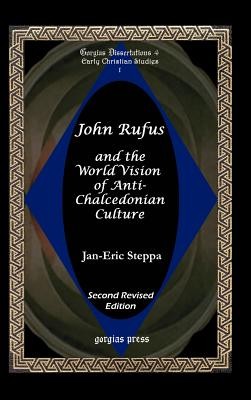
- We will send in 10–14 business days.
- Author: Jan-Eric Steppa
- Publisher: Gorgias Press
- ISBN-10: 1593331312
- ISBN-13: 9781593331313
- Format: 15.2 x 22.9 x 1.8 cm, kieti viršeliai
- Language: English
- SAVE -10% with code: EXTRA
John Rufus and the World Vision of Anti-Chalcedonean Culture (e-book) (used book) | bookbook.eu
Reviews
Description
The main sources for our knowledge about the opposition against Chalcedon in the Eastern Roman Empire in the fifth century are the hagiographic works of the Palestinian monk John Rufus, priest at Antioch and disciple of the great anti-Chalcedonian leader Peter the Iberian at Gaza. There are, in all, three works preserved from him, each work contributing in its own way to our understanding of the underlying motives behind the anti-Chalcedonian movement: the Life of Peter the Iberian, the Commemoration of the Death of Theodosius, and the Plerophories. The present study is an attempt to read the hagiographic works of John Rufus in search for the specific cultural idiom that once made his texts meaningful as communicative acts. Through these texts, we encounter a culture that internally identified itself on the basis of the self-confident claim of walking in the paths of the holy fathers. Its external borders, in turn, were defined in terms of opposition to a dominant culture, regarded as deeply polluted by the passions of secularism. As part of the eastern monastic culture, it considered itself a counter-culture guarding purity of ascetic conduct and orthodoxy from being defiled by the perverseness of the majority. Reading John Rufus] hagiography we find ourselves in the midst of a cosmological warfare between good and evil, where the great heroes of the anti-Chalcedonian movement enter into history as God's warriors against the rebellion of demons and heretics.
EXTRA 10 % discount with code: EXTRA
The promotion ends in 21d.02:56:52
The discount code is valid when purchasing from 10 €. Discounts do not stack.
- Author: Jan-Eric Steppa
- Publisher: Gorgias Press
- ISBN-10: 1593331312
- ISBN-13: 9781593331313
- Format: 15.2 x 22.9 x 1.8 cm, kieti viršeliai
- Language: English English
The main sources for our knowledge about the opposition against Chalcedon in the Eastern Roman Empire in the fifth century are the hagiographic works of the Palestinian monk John Rufus, priest at Antioch and disciple of the great anti-Chalcedonian leader Peter the Iberian at Gaza. There are, in all, three works preserved from him, each work contributing in its own way to our understanding of the underlying motives behind the anti-Chalcedonian movement: the Life of Peter the Iberian, the Commemoration of the Death of Theodosius, and the Plerophories. The present study is an attempt to read the hagiographic works of John Rufus in search for the specific cultural idiom that once made his texts meaningful as communicative acts. Through these texts, we encounter a culture that internally identified itself on the basis of the self-confident claim of walking in the paths of the holy fathers. Its external borders, in turn, were defined in terms of opposition to a dominant culture, regarded as deeply polluted by the passions of secularism. As part of the eastern monastic culture, it considered itself a counter-culture guarding purity of ascetic conduct and orthodoxy from being defiled by the perverseness of the majority. Reading John Rufus] hagiography we find ourselves in the midst of a cosmological warfare between good and evil, where the great heroes of the anti-Chalcedonian movement enter into history as God's warriors against the rebellion of demons and heretics.


Reviews